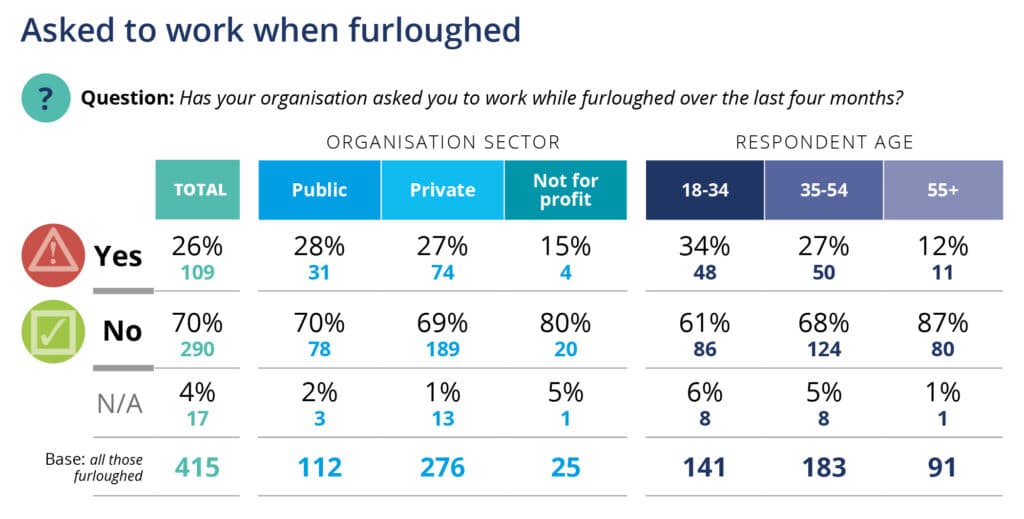Over a quarter of UK employees in organisations working for the public sector have been asked to work when furloughed
Press statements | read time: 2 min
Published: 25 August 2020

A nationwide survey of UK workers commissioned by business ethics specialists GoodCorporation has revealed that over a quarter[1] (28%) of employees whose organisations operate in the public sector were asked to work while furloughed. It is illegal to ask furloughed employees to work. These findings suggest that public sector contracts need to be carefully scrutinised. It is important to ensure that those already in receipt of public funds to pay staff costs have not wrongly applied for the job retention scheme and then abused the scheme by asking furloughed employees to work.

Government guidance on the furlough scheme states[2] that where organisations receive public funding for staff costs, they were not expected to use the scheme except in certain circumstances.
Commenting on the findings, GoodCorporation director Debbie Ramsay said, “Given the significant cost to the country of the Coronavirus response, this possible abuse of the Government’s own scheme by employers operating in the public sector should be investigated thoroughly. Failure to do so will erode public trust.”
“The Covid pandemic has had a devastating impact on working life, not just in the UK, but across the globe. Many businesses and employees have found themselves in a precarious position through no fault of their own. The Government’s Coronavirus Job Retention Scheme was designed to support businesses and workers alike. Any abuse of this is an abuse of taxpayers’ money and limits the Government’s ability to support other essential services.
Additional findings
Blue collar workers are the least likely to have been asked to work while furloughed (18%[3] reported working when furloughed) compared to white collar workers (31% asked to work when furloughed).
Business size also made a difference with 11 per cent of workers in large organisations (+5,000 employees) asked to work while furloughed, compared to 36% of workers in medium sized operations (250- 1,000 employees). This suggests that there is widespread abuse of the furlough scheme, even among large organisations with access to human resources and legal teams who should be providing guidance on the correct implementation of the worker retention scheme.
Approaches to the furlough scheme also varied by age and gender. Young people aged 18-24 are more likely (34%) to have been asked to work when furloughed compared to older workers aged 55 or over (12%)[4]. And men were more likely to be asked to work than women (29% vs 24%).
[1] Research conducted for GoodCorporation by Opinium Research from 10-20th July 2020 of 2001 working adults in the UK. Sample designed to be representative of the UK working population. Research conducted by email survey using Opinium’s omnibus panel. Population for this research is the UK working population estimated by the UK government to be circa 28,000,000 in employment – the overall analysis has 95% confidence level and +/-2% confidence interval some of the sub-data has a wider confidence interval and this is noted in footnotes where applicabl
[2] Coronavirus job retention scheme
[3] This is taken from a small sample of 24/135 (18%) blue collar employees, compared to 85/274 (31%) white collar workers. Estimated 95% confidence level and confidence interval of +/-6%
[4] A total of 48/131 (34%) aged 18-34 compared to a total of 11/91 (12%) aged 55+. 95% confidence level and +/- 8% confidence interval.
work with us
